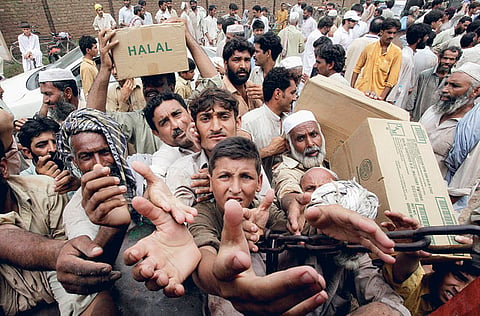Cast away the numbness
As a human tragedy of epic proportions unfolds in Pakistan, what counts most?

"Torrential rains continue to torment Pakistan, affecting 15 million to 20 million people…"
I have always been amazed at the way journalism numbs our senses. When I started work as a trainee broadcast journalist in one of the world's best media organisations, I was passionate about people first, then their stories. But somewhere somehow, I now struggle with numbers. People have become numbers.
The more the number of victims, the better the story. I remember the shock on my face when I heard an accident referred to as "fantastic" because the death toll had gone up. Earlier, I hurt over each of the victims who had a wife, a child a father, a sibling. Now they are just numbers.
Time to enliven those benumbed senses again. Pakistan is now coping with the most devastating floods in the last 80 years, along with economic, judicial, political and security crises. Nearly 1,500 people are dead, more than 20 million are affected and a fifth of the country is under water.
The floods have wiped out villages, farmland and infrastructure. Four million people are homeless. Most are living in wretched conditions on roadsides, sleeping in the open with little food and no clean water. Fathers are racing after relief trucks for food.
Impromptu camps have no bathing facility for women or children. Many could not pick up their belongings when the floods hit their villages, so they are wearing what they left home in. More than 53,000 pregnant women need our help; 3.5 million children are at risk from deadly diseases and babies are suffering from malnutrition and diarrhoea.
Hillary Clinton has announced that the US government, already the biggest donor, would contribute an additional $60 million (Dh220 million), bringing its total to more than $150 million. The European Union has raised its pledge to more than $180 million. Britain said it would double its contribution to nearly $100 million and Germany raised its aid to $32 million. UAE has done its share — sending aid, airlifting flood victims. Pakistan has decided to accept flood aid from its neighbour India, saying the offer was a "very welcome initiative".
Every penny counts
How are you helping, as an individual? I don't care if you are Hindu, Christian, Muslim, Indian, British or Australian. If I woke up one morning to see my home sinking and struggled to feed my child — I would not care about the race or religion of the first person who offered me a morsel of food. Hunger and the right to basic amenities are the same for all. Every penny counts. Help first, judge later.
Honest query: would you be at peace only when you know that a bag of provisions you sent to a ravaged village home did reach a family or would you rather be tight-fisted, battling your anxieties and prejudices? Guilt, fear and pity will not help. You may not really know; your concerns may be justified. But you send it with a prayer.
Help, volunteer, contribute — it may be as precious as a widow's copper coin. Charity would not really be charity if you gave it only to those you believed were "deserving". A friend working hard to send supplies to Pakistan told me that some of the donations were expired products. Taliban and some Pakistani politicians and media demand that their government reject US aid.
Some leaders do not want the US to replicate the "Chinook diplomacy".
Donors fear Taliban insurgents could regroup. President Asif Ali Zardari's government has been criticised for failing to respond quickly enough and charities, which have alleged links to terrorism, have been active in the flood-hit areas. Care International called on the UN to explain to donors that money was not going into the hands of the Taliban. The victims are 'the mothers, the farmers, and the children'.
Holbrooke said it's impossible to assess whether Al Qaida or others are taking advantage of the floods because "we can't even get in there." All these may be genuine concerns.
Meanwhile, somewhere a child is dying.


